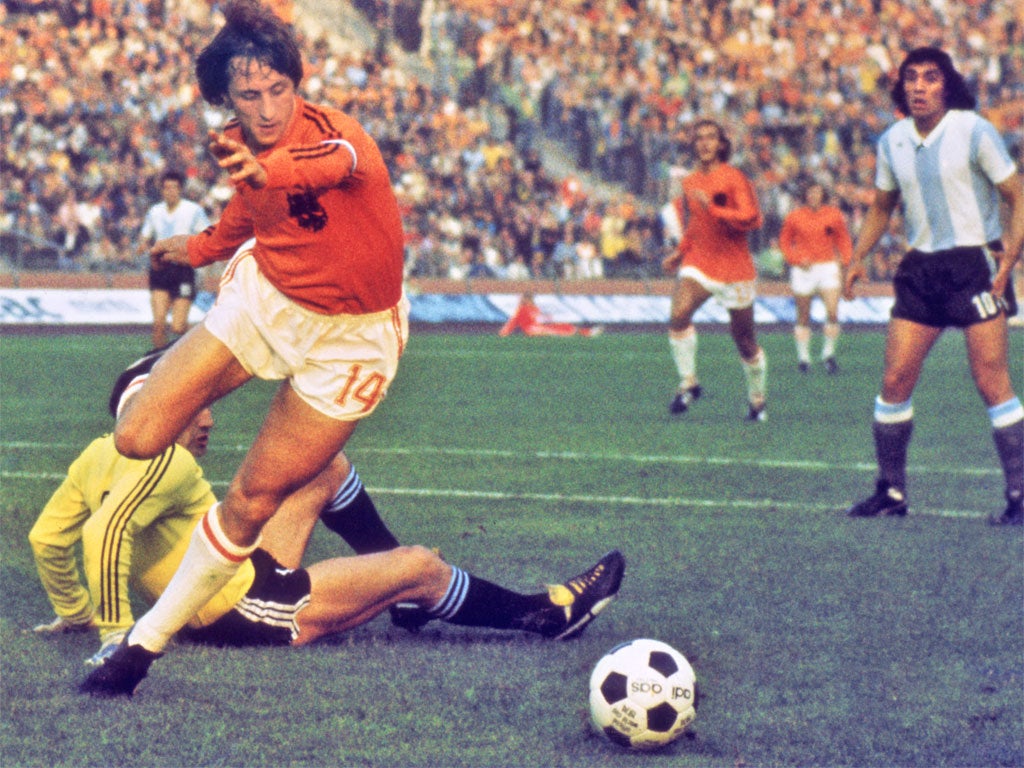James Lawton: Beware the heirs of Cruyff and Bergkamp
The Dutch can wake up in the morning disliking the hotel decor and go on strike

It says a lot for the enduring genius of Dutch football that atonement for atrocious deeds and sometimes near unbelievable anarchy is never too far around the corner.
However badly they stain a brilliant if frustrating tradition – and nothing could have been worse than their thuggish attempt to neutralise Spanish brilliance in the last World Cup final – they carry always the means of redemption.
Tonight at Wembley, for example, England's besieged caretaker Stuart Pearce may have to pay a crushing price after days of scavenging for players who might not be automatically dwarfed by a call to share the field with such as Robin van Persie, Wesley Sneijder and Arjen Robben.
As a harbinger of possibilities at this summer's European Championship, tonight's game might have little relevance, no more than England's friendly match wins over Spain and Sweden, but the odds are we will at least glimpse something long enshrined in the records of international football. It is that the Netherlands, from the dazzling appearance of the young Johan Cruyff and through such masters as Neeskens, Gullit, Van Basten, Rijkaard and Bergkamp, retain a quality to threaten the world.
But for the 1988 European Championship, it has remained a threat, a promise of another football planet, and the accumulation of failed ambition had that soul-destroying denouement in the Soccer City stadium in Johannesburg when Bert van Marwijk's team produced a Doomsday version of the old concept of total football.
Yet if Dutch stock has slipped since then, with a 3-0 thrashing by young Germany pushing them into third place in the list of favourites for Euro 2012, they are never a team to discount. They are too ornery for that, too perverse in their judgement of when to play and when not. The history of Dutch football is riddled with such inconsistency and it was never more so than in Euro 96 when they came to play England at Wembley in a state of civil war.
"You never know with the Dutch," said one old pro after England's 4-1 victory and brilliant performances from Teddy Sheringham and Alan Shearer. "They can wake up in the morning disliking the hotel decor and then go on strike."
Two years later, they seemed to have the World Cup at their mercy after a superb victory over Argentina and a goal from Dennis Bergkamp that carried the game into the realm of fantasy. Yet before the semi-final with Brazil, Johan Neeskens, now an assistant coach, confided to a Dutch journalist: "Everything depends on whether Bergkamp plays." The startled hack said that he was unaware that Bergkamp was injured. "He isn't," said Neeskens. "I said it depends on whether he plays, really plays."
He didn't and Brazil were beaten in the final by Zinedine Zidane in the Stade de France.
The biggest pratfall, of course, came in Munich in 1974 when the great West German team of Franz Beckenbauer and Gerd Müller were run ragged by an exultant Cruyff before the Dutch decided that victory was not enough – they also had to humiliate their bitter foes. They paid with the first of three World Cup final defeats.
Yet three years later, on their way to the 1978 World Cup final against Argentina in Buenos Aires, the Netherlands showed precisely why the world crown would have sat so easily on their shoulders. They did it with their only victory at Wembley – the score was a mere 2-0 but long before the end most everybody, and not least the ill-fated England manager Don Revie, tired of measuring the distance between the teams.
On the same night Cruyff's Barcelona had scheduled a prestige friendly with Paris St-Germain and demanded compensation for the money they would lose by releasing the Golden Dutchman. The payment, of around £30,000, delivered one of the finest exhibitions ever seen in the great stadium.
At the Nou Camp three days earlier Cruyff's dismissal from a league match with Malaga provoked a riot – and the surreal sight of a large man on crutches leading the charge on to the field and in pursuit of the referee. At the climactic moment, the assailant brought back his arm and released one of his crutches. He then slowly toppled on to his back.
As the riot reached a peak – and television vans were burnt – Cruyff shrugged and assured the English public that he would present himself at Wembley.
Jan Peters, who would prove a peripheral figure in the Dutch team, scoring four goals in 31 appearances, scored twice at Wembley but it would always be Cruyff's game. He barely crossed the halfway line but he pulled every string. It was a performance of astonishing vision and touch. It was Dutch football at its most sublime, rising from the perversity and the flames.
It was reason enough for forgiveness – as we may be reminded tonight.
Join our commenting forum
Join thought-provoking conversations, follow other Independent readers and see their replies
Comments